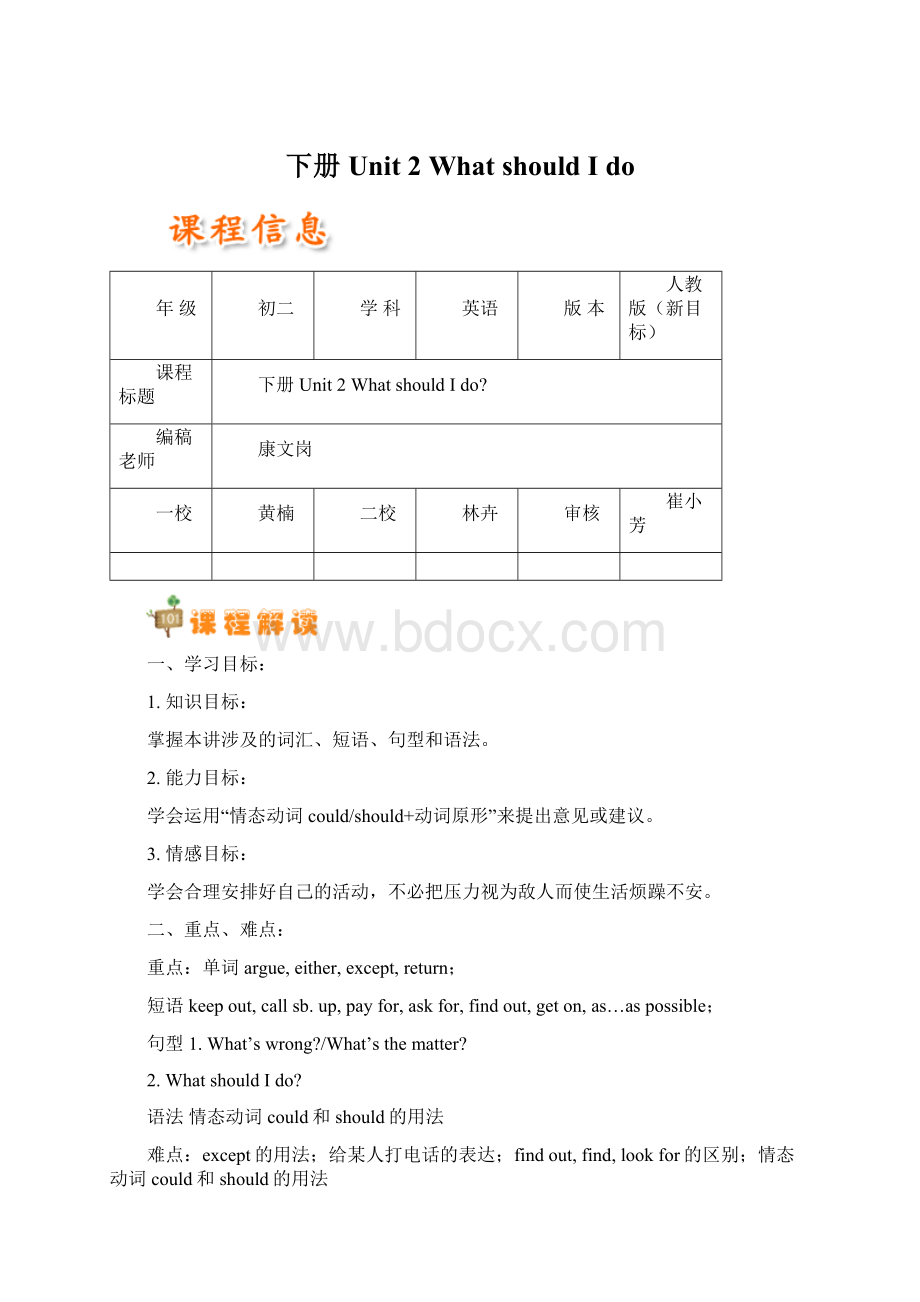下册Unit 2 What should I do.docx
《下册Unit 2 What should I do.docx》由会员分享,可在线阅读,更多相关《下册Unit 2 What should I do.docx(18页珍藏版)》请在冰豆网上搜索。

下册Unit2WhatshouldIdo
年级
初二
学科
英语
版本
人教版(新目标)
课程标题
下册Unit2WhatshouldIdo?
编稿老师
康文岗
一校
黄楠
二校
林卉
审核
崔小芳
一、学习目标:
1.知识目标:
掌握本讲涉及的词汇、短语、句型和语法。
2.能力目标:
学会运用“情态动词could/should+动词原形”来提出意见或建议。
3.情感目标:
学会合理安排好自己的活动,不必把压力视为敌人而使生活烦躁不安。
二、重点、难点:
重点:
单词argue,either,except,return;
短语keepout,callsb.up,payfor,askfor,findout,geton,as…aspossible;
句型1.What’swrong?
/What’sthematter?
2.WhatshouldIdo?
语法情态动词could和should的用法
难点:
except的用法;给某人打电话的表达;findout,find,lookfor的区别;情态动词could和should的用法
三、知能提升
(一)重点单词
[单词学习]
◎argue
【用法】argue是不及物动词,意为“争论;争吵”,过去式是argued,名词形式是argument。
常用短语arguewithsb.或haveanargumentwithsb.意为“与某人吵架”。
若表示“因某事与某人争吵”则用arguewithsb.aboutsth.。
【例句】1.Iarguedwithmysisterlastnight.昨晚我和妹妹吵架了。
2.Don’talwaysarguewitheachotheraboutmoney.不要总是为钱互相争吵。
【考查点】短语本身
【易错点】错用介词
【考题链接】
YesterdayIarguedTonythistopic.
A.do;aboutB.with;aboutC.about;withD.at;with
答案:
B
解题思路:
本题考查介词的用法。
arguewithsb.aboutsth.意为“就某事和某人争论”。
故选B。
◎either
【用法】either作副词,意为“也(不)”,通常用于否定句的句尾,其前用逗号隔开。
【例句】Shedoesn’tlikedancing.AndIdon’tlikeit,either.她不喜欢跳舞,我也不喜欢。
【考查点】either,too与also的用法
too意为“也”,通常用在肯定句中,比较口语化,放在句尾,其前用逗号隔开。
Hehasanewmobilephone.Ihaveone,too.他有一个新手机,我也有一个。
also一般用于肯定句中,比较正式,通常放在be动词、情态动词或助动词之后,行为动词之前,位置接近动词,位于句中。
Tomcanplayfootballandhisbrothercanalsoplayfootball.汤姆会踢足球,他弟弟也会。
【易错点】混淆三个“也”的用法
【考题链接】
—I’mnotsurewhichtietowearfortheparty.
—God!
Ihavenoidea,.
A.tooB.neitherC.eitherD.also
答案:
C
解题思路:
本题考查词义辨析。
neither意为“两者都不”。
too,either,also都意为“也”,但too,also常用于肯定句,而either常用于否定句。
本句中的答语是否定句,故选C。
句意为“——我不知道系哪条领带去参加聚会。
——天哪!
我也不知道。
”
◎except
【用法】except是介词,意为“除……之外”(除外的东西不包括在内,有否定、排除等含义)。
【例句】1.Weallagreedexcepthim.我们都同意,只有他不同意。
2.HedoeshishomeworkeverydayexceptSunday.
除了周日以外,他天天做作业。
【考查点】辨析except与besides
besides作介词,表示“除……还有”,指在整体之外再加上一个或一部分,即整体中包含besides后面的部分。
Besidesmilk,weneedvegetables.除了牛奶外,我们还需要蔬菜。
ManystudentslikefootballbesidesTom.除汤姆外,还有很多学生喜欢足球。
【易错点】混淆了两者的用法
【考题链接】
—AllthestudentsinClassOnewenttothecinemaLiPing.Why?
—Becausehehadastomachache.
A.besidesB.withoutC.exceptD.beside
答案:
C
解题思路:
besides和except都意为“除……之外”。
besides包含其后的部分,而except不包含其后的部分。
without意为“没有”。
beside意为“在……旁边”。
由答语“因为他肚子疼”可知“其他人都去了,他没去”,用except。
◎return
【用法1】用作及物动词,意为“归还;送回”,相当于giveback。
用returnsth.tosb.或returnsb.sth.表达“把某物还给某人”时,就不再使用back。
【例句】YoushouldreturntheguitartoDickontime.你应该准时把吉他还给迪克。
【用法2】用作不及物动词,意为“回来;回去”。
【例句】HereturnedtoParisfromLondonyesterday.他昨天从伦敦回到了巴黎。
【考查点】return作及物动词的用法
【易错点】return和back连用
【考题链接】
根据句意及汉语提示填写单词
I(归还)thebooktothelibraryyesterday.
答案:
returned
解题思路:
“归还”可以用giveback或return表示。
本题中只有一个空,故应用return。
由yesterday知用过去式。
[即学即练]
1.—Sorry,Idon’tknowtheword.
—Idon’tknowit,.
A.tooB.wellC.alsoD.either
2.EveryoneJimwenttotheconcertbecausehehadalotofhomeworktodo.
A.onlyB.besideC.besidesD.except
3.Stop(争论)withyoursisterabouttheproblem.
4.Ireturnedthenovelbacktothelibrarylastweek.(改错)
(二)重点短语
[短语学习]
◎keepout
【用法】动词短语,意为“不让……进入”。
【例句】1.Danger!
Keepout!
危险!
切勿入内!
2.Toprotectyourself,youshouldkeepthestrangersout.
为了保护你自己,你不应该让陌生人进来。
【考查点】短语本身
【易错点】没有识记短语
【考题链接】
—Thewindowsarebrokenandneedtoberepaired.
—Ithinkso.Theycanhardlythecoldnow.
A.keepoutB.giveoutC.takeoutD.putout
答案:
A
解题思路:
keepout意为“不让……进入;抵御”;giveout意为“分发”;takeout意为“取出”;putout意为“扑灭;拿出”。
由题意窗子破了,就不能“抵御,挡住”寒冷了,可知选A。
◎callsb.up
【用法】callsb.up为动词短语,意为“打电话给某人”,call此时意为“打电话”,副词up可以省略。
如果宾语不是人称代词,也可以说callupsb.。
【例句】1.Remembertocallmeuptomorrow.记住明天给我打电话。
2.Ifyouhavetrouble,pleasecallme.如果你有麻烦,请打电话给我。
【考查点】打电话时的用语
表示“打电话给某人”的短语还有:
ringsb.(up),phonesb.,givesb.acall/ring。
【易错点】没有识记短语
【考题链接】
Imymotherthismorning,butnobodyanswered.
A.gotupB.lookedupC.calledupD.setup
答案:
C
解题思路:
由后句中的answered(接电话)可知用callup(打电话),故选C。
◎payfor
【用法】payfor意为“付……账;付买……的钱”。
payfor中间还可加表示金钱之类的词,其主语是人。
【例句】Wepaidtwoyuanforthebook.买这本书我们花了两元钱。
【考查点】短语搭配
【易错点】pay的过去式
【考题链接】
Howmuchdidyoupayyourcar?
A.onB.forC.toD.at
答案:
B
解题思路:
考查介词搭配。
pay…forsth是固定搭配,意为“给……付款、付账”,题意为“你买车付(花)了多少钱?
”所以选B。
◎askfor
【用法】asksb.forsth.意为“向某人要某物”。
【例句】1.Ifyouareintrouble,youcanaskhimforhelp.
如果你遇到了麻烦,你可以向他求助。
2.Sheoftenasksforhisadvice.她经常征询他的意见。
【考查点】ask的用法
asksb.todosth.意为“要求/请求某人做某事”,其否定结构为asksb.nottodosth.意为“要求/请求某人不要做某事”。
Sheaskedmetolendhersomemoney.她请求我借些钱给她。
【易错点】没有识记短语结构
【考题链接】
1.Sheoftenaskshermotherpocketmoney.
A.byB.withC.forD.as
答案:
C
解题思路:
asksb.forsth.表示“向某人要某物”。
句意为“她经常向她妈妈要零花钱”。
2.—John,mycomputerdoesn’twork.
—WhynotaskMrLiuit?
A.tobuyB.nottobuyC.tocheckD.nottocheck
答案:
C
解题思路:
由答语的句意为“为什么不让刘先生检查一下呢?
”,可知此句为asksb.todosth.结构。
根据句意,故选C。
◎findout
【用法】findout意为“找到,发现,查明”,多指通过调查、询问、打听之后“搞清楚,弄明白(发现真相或事实等)”。
【例句】Pleasefindoutwhenthetrainleaves.请查一下火车什么时候离站。
【考查点】辨析findout,find与lookfor
findout意为“查明真相,弄清缘由”,强调经过理解、分析、思考等最后得到认证的一种结果。
其后的宾语常是某个情况、事实。
find意为“找到,发现”,通常指找到或发现具体的东西,强调寻找的结果。
Hedidn’tfindhisbike.他没有找到他的自行车。
lookfor意为“寻找”,是有目的地找,强调寻找的过程。
Heislookingforhisshoes.他在找他的鞋子。
【易错点】混淆find与findout
【考题链接】
1.Wemustwhobrokethewindow.
A.findB.lookforC.findout
答案:
C
解题思路:
find表示“寻找”的结果,意为“找到,发现”;lookfor意为“寻找”,强调“寻找”的动作;而findout意为“通过调查、询问弄清事实真相”。
故选C。
2.—Whatareyoudoing?
—I’mmywallet.
A.lookingforB.findingC.findingoutD.looking
答案:
A
解题思路:
lookfor意为“寻找”,强调“找”的动作,故选A。
而find作为“找到”讲时不能用于进行时。
◎geton
【用法】geton意为“相处,进展”,常用短语为geton(well)withsb.,意为“与某人相处(融洽)”。
相当于短语getalong(well)withsb.,后面还可以接物。
getonwithsth.表示“某事进展如何”。
【例句】1.Thethreeboysgetonverywelltogether.这三个男孩在一起相处得很好。
2.Howareyougettingon/alongwithyourfriends?
你和朋友们相处得怎么样?
3.How’syoursongettingonwithhisEnglish?
你儿子的英语学得怎么样?
【考查点】短语本身
【易错点】用how进行特殊问句的提问
【考题链接】
Sheisverykindandhelpful.Shealwaysherfriends.
A.getsonwellwithB.gettingwellwithC.gettingonwellwithD.getswellwith
答案:
A
解题思路:
根据前句及always可判断此句为一般现在时,表示“和某人相处得好”应用getonwellwithsb.结构。
故选A。
◎as…aspossible
【用法】as…aspossible意为“尽可能……”,可以转化为as…asonecan/could。
这两个as之间要用形容词或副词的原级。
【例句】1.WemuststudyEnglishashardaspossible.我们必须尽量努力学习英语。
2.WeshouldreadEnglishasmuchaspossible.
=WeshouldreadEnglishasmuchaswecan我们应当尽可能多地读英语。
【考查点】短语本身
【易错点】as…as中间用形容词或副词的原级
【考题链接】
Theyrantotheclassroomasfastastheycould.(同义句转换)
Theyrantotheclassroom.
答案:
asfastaspossible
解题思路:
as…aspossible的同义表达是as…asonecan/could。
[即学即练]
1.Itisverycoldoutside.Whynotputonthecoattothewind?
A.cutupB.keepoutC.takeoutD.turnoff
2.Theteachertoldmymotheryesterday.
A.callhimupB.tocallhimupC.calluphimD.toringuphim
3.Heisworriedbecausehehasnomoneytotheschoolyear.
A.takeB.spendC.payforD.cost
4.Canyouwhowrotetheletter?
Thereisnonameinit.
A.lookforB.callupC.findoutD.keepout
5.Goodmannersusuallyhelppeopletoeachother.
A.getstartedB.gettogetherC.gettoD.getonwellwith
6.Weshouldtryourbesttomakepossible.
A.asfewermistakesasB.asfewmistakesas
C.mistakesasfewasD.aslessmistakesas
(三)重点句型
[句型学习]
◎What’swrong?
/What’sthematter?
【用法】这两个句子均意为“……怎么了?
”或“……出了什么毛病?
”,后可接withsb/sth。
【例句】1.What’swrongwithyou?
Youlooksad.你怎么了?
你看起来很难过。
2.What’swrongwiththecar?
这辆小汽车出什么毛病了?
【考查点】与“……怎么了(出什么毛病了)?
”有关的一些表达:
表示“……出了什么问题”的陈述句,可以用:
Somethingiswrongwith…
Thereissomething/nothingwrongwith…
【易错点】定冠词the的用法
【考题链接】
1.There’swithyourwatchbecauseitoftenkeepsbadtime.
A.nothingwrongB.somethingwrongC.wrongnothingD.wrongsomething
答案:
B
解题思路:
something,nothing,anything是不定代词,修饰它们的形容词要后置。
本题由keepbadtime可知是“你的手表出了毛病”,故选B。
2.What’swrongwithDavid?
(同义句转换)
What’swithDavid?
答案:
thematter
解题思路:
What’swrongwithsb.?
与What’sthematterwithsb.?
都可用来询问“某人怎么了?
”
◎WhatshouldIdo?
【用法】should是情态动词,表示义务、责任或劝告、建议等,意为“应该,应当”,后接动词原形。
否定式为shouldnot,常简写为shouldn’t。
【例句】1.Weshouldaskherfirst.我们应该先问问她。
2.Youshouldn’tbesocareless!
你不应该这样粗心!
【考查点】should的用法
【易错点】在具体的语境中错用should
【考题链接】
—Iarguedwithmymother.Shewasverysad.WhatshouldIdo?
—.
A.Havearest,pleaseB.YoucanjointheEnglishclub
C.YoumaylistentosomemusicD.Youshouldsaysorrytoher
答案:
D
解题思路:
本题考查情景交际用语。
给别人提出建议时,可以用Youshould…。
句意为“——我和我妈妈吵架了。
她很难过。
我该怎么办?
——你应该向她道歉。
”
[即学即练]
1.—
—I’mnotfeelingwell.Myheadhurts.
A.What’sthematter?
B.Whatareyoudoing?
C.AreyouOK?
D.Areyoufeelingbetter?
2.—Idon’thaveenoughmoneytobuyagiftformyfriend.WhatshouldIdo?
—.
A.That’sagoodideaB.Goodluck
C.Youcouldgetatutortocometoyourhouse
D.Youcouldgetapart-timejobtosavesomemoney
(四)重点语法
[语法学习]
如何用情态动词could,should提建议
could和should都是情态动词,后接动词原形。
都可用来提建议,但侧重点不同。
在陈述句中,could用来委婉客气地陈述看法和提出建议,向对方提供一个选择的内容,常译成“可以;不妨”。
should表示义务和责任,说话者语气较肯定,指按照常理该怎么样,常译成“应该”。
如:
Youcouldborrowsomemoneyfromyourbrother.你可以向你弟弟借些钱。
Youshouldborrowsomemoneyfromyourbrother.你应该向你弟弟借些钱。
在疑问句中,could用于以委婉的语气向别人提出要求、建议或劝告,此时could不表示过去,肯定回答用can或sure。
如:
—CouldIhaveacupoftea,please?
我可以喝一杯茶吗?
—Yes,youcan.是的,可以。
—Couldyoupleaseopenthedoor?
请你打开门好吗?
—Sure.当然可以。
should用于第一人称的疑问句当中,用来询问对方意愿、征求对方意见。
如:
Whatshouldwedonow?
我们现在该怎么办呢?
【考题链接】
1.Schoolsallowstudentsatleastonehouradayforsports.
A.wouldB.mightC.shouldD.could
答案:
C
解题思路:
should表示“应该”。
句意为“学校应该允许学生每天至少有一个小时的运动时间”。
2.—Iuseyoureraser,LiFang?
—Certainly.Hereyouare.
A.WillB.CouldC.MustD.Should
答案:
B
解题思路:
这是征求对方意见的句型,could的语气最委婉、